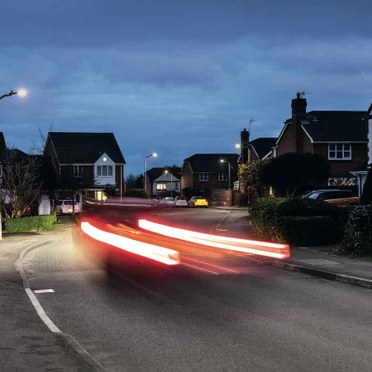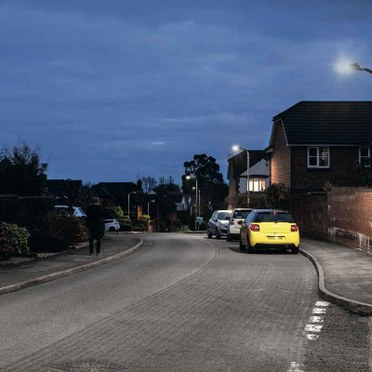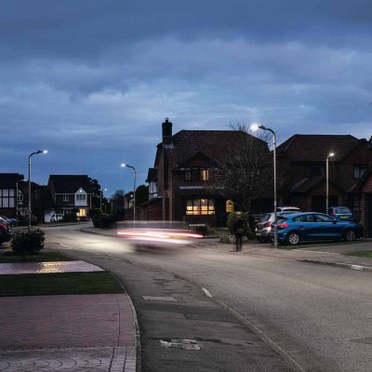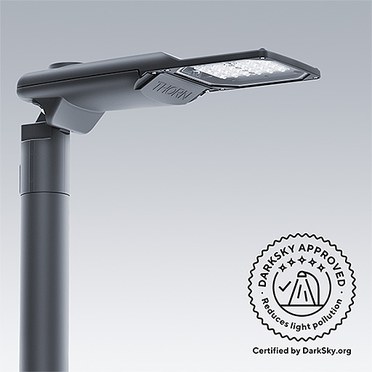Newport City Council
Products
- Lamp efficacy
Lamp efficacy
Ensuring the lamp efficiently converts electricity into light (lm/W).
- Ballast classification
Ballast classification
Controlling the electricity supply to the lamp (Energy Efficiency Index).
- Luminaire distribution
Luminaire distribution
Controlling light emission using optics which bend and shape the light to the correct location.
- System efficacy
System efficacy
Combining optical and thermal control within the luminaire (luminaire lm/W).
- Presence/absence detection
Presence/absence detection
Presence: Lights automatically turn on/off with movement. Absence: Lights automatically turn off and must be manually switched on.
- Daylight detection
Daylight detection
Artificial lighting which responds to the natural light conditions.
- Constant illuminance
Constant illuminance
A function designed to produce correct light levels for the duration of the maintenance period.
- Task-scene setting
Task-scene setting
Allowing the user to set scenes and adapt the lighting to different tasks.
- Timed off
Timed off
Automatic cut-off can be installed to turn all lights off during unoccupied hours.
- Task lighting
Task lighting
Lighting task areas with the correct amount of light.
- Zoning of lighting
Zoning of lighting
Lighting is zoned according to area use.
- Maintenance schedule
Maintenance schedule
Maintenance must be performed in response to product age, performance and environment.
- Waste light
Waste light
Eliminating waste light which does not hit the intended target.
- Reflectance
Reflectance
Taking advantage of light which is reflected from the surface within the space.
- Visible smart metering
Visible smart metering
Results of actions can be quickly seen as increased or decreased energy use to encourage responsible energy consumption.
Thorn Lighting supports Newport City Council’s efforts to tackle climate change
Thorn Lighting won the tender evaluation process from Newport City Council to supply the lighting for all the residential roads and traffic routes across the city. Thorn’s bid, using Isaro Pro luminaires, was subjected to a number of on-site tests by an independent consultant. The tests included checking the light levels and energy consumption and then evaluating them on the cost of ownership model over a 20 year period. Thorn’s bid was the best submitted for the lighting replacement, the Isaro Pro LED met with all the criteria required by Newport City Council to replace the original, which were energy consuming high pressure sodium fittings. This included complying with the council’s corporate plan objective to promote economic growth and regeneration whilst protecting the environment and reducing operating costs.
A council report says that the move to LED’s could be a "major step" towards being carbon neutral by 2030 and subsequent saving on energy usage means a reduction in the hours of part lighting is more affordable. After the first year of completion, Newport City Council say the move to LEDs could see an electricity bill saving of more than £500,000 and a reduction in the Council's carbon emissions of 6.5 per cent per year.
Thorn has supplied 15,000 Isaro Pro, robust and high-performance LED luminaires for the lighting upgrade providing a truly futureproof lighting solution with a 70% reduction in energy usage. The Council has used a warm white light at 3000 kelvins and this specification has been endorsed by a number of campaigners including the International Dark-Sky Association. Isaro Pro is a completely sustainable luminaire offering long life and low energy consumption and has been specifically designed to prevent light pollution and minimum disturbance to the environment. Offering a lifetime of 100,000 hours (at 25°C), efficacy of up to 139lm/W and control options including RF wireless, Isaro Pro guarantees years of reliable performance at an exceptionally low cost of ownership. Isaro Pro is easy to install and saves on maintenance costs as all the internal components can be accessed from the top of the fitting without the need for tools.
The luminaires are equipped with Tridonic NFC (Near Field Communication) Drivers which provide the council with the ability to adjust the light output, introduce dimming regimes and part night lighting, all with the use of an App. In addition to allowing the Council to reduce the light output by dimming it can also be increased, for example, in response to a complaint from the public that the light levels are not high enough.
The running current of the luminaire LED drivers can be increased using the NFC App and this is done simply by ensuring that the combination of the number of LEDs and the Driver selected for each road application has the range/capacity available to be decreased and increased in terms of the light output. This generally means selecting a higher number of LEDs, run at a relatively low drive current to begin with. The additional benefit of using this selection method is reduced glare, increased comfort and a greater sense of wellbeing for pedestrians and road users alike, due to the lower intensity of the LEDs.
Research has shown that the use of LED technology in street lighting has positive benefits, such as a reduction in street crime and the fear of street crime. This analysis from eight different studies found that improved street lighting can reduce the crime rate by an average of 7%. The project fully supports the Council’s efforts to tackle climate change, meet CO2 reduction targets and reduce operating costs.




